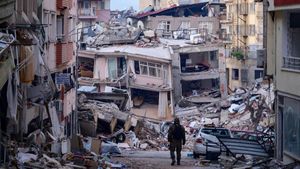February 23 is observed across Russia as Defender of the Fatherland Day, commemorated since 1922 and steeped in historical significance. Originally celebrated as the Day of the Red Army and Navy, the holiday was rooted deep within the nation’s military traditions, crafted during the early 20th century. It honors those who have defended the country, from the members of the Red Army during World War II to contemporary soldiers holding the frontline today.
The holiday's inception dates back to the fourth anniversary of the formation of the Red Army, which was mandated by the Presidium of the All-Russian Central Executive Committee (VTSIK) to be marked each year on February 23. It evolved through the decades, particularly gaining prominence during the Great Patriotic War when pivotal victories under the Red Army's command, like the Battle of Stalingrad, were celebrated.
Over time, the celebration morphed, adopting various names such as the Day of the Soviet Army and Navy until its final title, Defender of the Fatherland Day, was established by President Boris Yeltsin on March 13, 1995. The changing of the title reflected the broader recognition of all men as potential defenders of the nation, leading to widespread celebration among families who express their gratitude and respect for the male figures within their households.
Every year on this day, by law, the President of the Russian Federation lays flowers at the Tomb of the Unknown Soldier near the Kremlin wall, signifying respect for those who lost their lives defending Russia. Various cities host grand parades, ceremonies, and concerts to demonstrate national pride and appreciation for military service. Decorations adorn public spaces with banners and flags, creating festivity around the solemnity of the occasion.
Notably, this year’s celebrations hold special importance as 2025 has been declared the Year of the Defender of the Fatherland. Governor of St. Petersburg, Alexander Beglov, highlighted the significance of the holiday, stating, “I wish victory to our soldiers who are fighting at the front, and for them to return home soon.” His remarks were shared through the city's official press service, emphasizing the emotional and social importance of recognizing those who serve.
Beglov's message also reflected the intent to honor those who have ostensibly dedicated their lives to the defense of Russia. “On this day, every family celebrates those who chose to serve the Motherland,” he remarked, reinforcing the connection between personal sacrifice and national identity.
Celebration doesn’t solely revolve around military acknowledgment. Families routinely exchange gifts and tokens of appreciation, ranging from practical household items to thoughtful presents reflecting the holiday's spirit. Not only has the day been allotted official recognition, but it has also become embedded within the societal fabric, celebrated among civilians as well.
Across the country, variant festivities can be seen. Major cities organize large-scale events encapsulating military pride; smaller communities might celebrate with local traditions and memorials to honor their residents who have served or are currently serving. The holiday has evolved significantly since its roots, now embodying broader patriotic sentiment rather than being strictly military-focused.
For many Russians, this date serves as not just another holiday but as a poignant reminder of the history and struggles faced by their ancestors. Schools often organize educational programs and discussions, ensuring younger generations are aware of the holiday's importance and the sacrifices made to maintain their country's sovereignty.
February 23rd also coincides with the International Day of Understanding and Peace, recognized worldwide, and marks various cultural observances, which adds to the day's multifaceted significance. The blending of personal, national, and international sentiments on this one date provides layers of meaning for those who celebrate.
The weighty tradition of Defender of the Fatherland Day remains relevant today, cherished for its ability to unite families, honor military personnel, and reinforce national pride. It acts as both a historical tribute and contemporary celebration, ensuring the legacy of valiant defenders of Russia persists through generations.
Whether through military parades, family gatherings, or government ceremonies, Defender of the Fatherland Day continues to embody the spirit of dedication, courage, and community within the Russian psyche.



